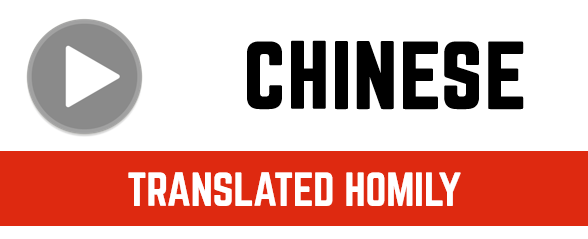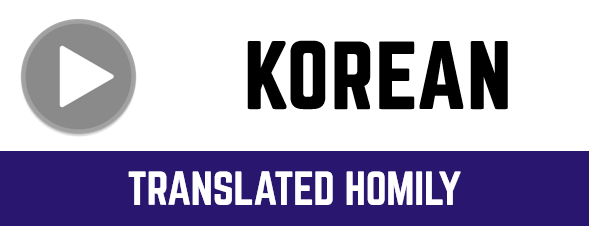Last week, we talked about overcoming the fear of speaking the truth. Today, the theme is seeking the truth. Many of you have asked me to address the topic of racism, so let’s seek the truth as best we can regarding racism. Let’s try to find out what’s morally true, what are the facts, and how we can contribute to its eradication.
[Listen to Fr. Justin’s homily here.]
Part 1
Part 2
[Watch Fr. Justin’s homily delivery here.]
Jesus’ teaching in the Gospel gives us guidance in our search for truth:
1) He says, “Whoever loves father or mother more than me is not worthy of me; and whoever loves son or daughter more than me is not worthy of me” (Mt 10:37). This teaching was just as difficult for people in Jesus’ time as it is for us, because family relationships were extremely important back then (Curtis Mitch & Edward Sri, The Gospel of Matthew in Catholic Commentary on Sacred Scripture, 148). Do we love Jesus more than our family? As we’ve said many times, to love Jesus more than our family doesn’t mean to love them less, but to love them more than we already do. That said, as the Catechism states, family ties are important, but they’re not absolute (2232).
Jesus says that He is truth (Jn 14:6), so let’s look again at His teaching, ‘Whoever loves father or mother more than [truth] is not worthy of me; and whoever loves son or daughter more than [truth] is not worthy of me.’ This is good, because when we love truth even above our family, then we can no longer be pushed around by false opinions or manipulated by the crowd.
Most of us will need to train ourselves to love the truth above all else, because we were raised to believe that all truth is subjective or that family and relationships are the most important criteria for life.
2) “Whoever does not take up their cross and follow me is not worthy of me” (Mt 10:38). Jesus is not only telling us to bear inconveniences but be ready to suffer a shameful death in order to follow Him. Remember, crucifixion in Roman times was meant to intimidate whole populations into conformity: They would crucify criminals in public, along roads, to warn others not to go against their rule. So, to follow Jesus and the truth means a cross will come and we shouldn’t be surprised (Daniel Mueggenborg, Come Follow Me, Year A, 212-213).
3) “Whoever finds their life will lose it, and whoever loses their life for my sake will find it” (Mt 10:39). Conforming ourselves to truth means we lose our life in the sense that we’re constantly adapting what we currently know to reality, and this is like a daily dying to self. You know how we sometimes feel badly when we change our mind about something? It’s similar to when I realized that I couldn’t see people for spiritual direction anymore as a pastor. When I accepted the truth that, as pastor, I had to focus on the sacraments, preaching, and leadership, an old part of me had to die. But I found a better life, if you will, because I could love people more authentically, and ultimately, it was better for all of you.
Some of us are stubborn and cling to our opinions even when we receive new factual information, and, while it may feel good never ‘to admit we were mistaken,’ we’re just fooling ourselves, because, in the end, we’re following something false. Life is not about appearing right in front of others, and the point of discussions is not to win, but to find the truth. That means we must follow the truth wherever it leads us. And if that means changing our opinion, so be it. There is so much freedom here. When I discovered this, I could never lose a discussion anymore! Because I wasn’t in it to win! The win is when I learn the truth!
So let’s now try to seek the truth with regard to racism.
1) The first point is to start with moral principles. It should be obvious to everyone that racism is a grave moral evil (CCC 1935). We should feel a righteous anger whenever someone is unjustly discriminated against, and I hope all of us do. It’s good that everyone was outraged at the death of George Floyd, the way he suffered, and the way four men who are supposed to protect us contributed to his death.
Some of us also have been personally affected by racism. It happened in my family. I told you how some members of the Chinese side of my family at one point wouldn’t accept my Caucasian mother. A survey by Angus Reid, for example, showed that half of Chinese Canadians have been insulted since the pandemic started, and 43% have been threatened or intimidated. To seek the truth, we need to acknowledge the deep pain many people, including some of us, have experienced, and then try to heal.
We should also do everything we morally can to end racism, which means not ever being racist ourselves, teaching others not to be racist, and correcting people when they are. We should participate in events and peaceful protests to end racism, but, as Christians, most importantly pray for conversions of heart.
There should also be a condemnation of riots and looting, because the ends don’t justify the means. To say riots are wrong does not mean we’re being light on racism. One error is that because racism is so heinous, any means is necessary to end it or it’s understandable if people riot. Evil cannot be corrected by more evil.
We must follow moral forms of protest, as in 1955, in Alabama, 40,000 black Americans refused to take the bus to and from work and crippled the city’s buses financially.
There should also be a healthy respect towards police officers and all lawful authority. This doesn’t mean we can never criticize them; respect means we hold them to a high standard.
2) Search for the facts. While moral principles on racism are clear, sometimes concrete facts are disputed. Is there systemic racism in Canada? How much? Against whom? How much corruption is there in the police? What are the facts regarding racism in Canada as opposed to the U.S. and other countries? Some might object to these questions even being raised, thinking there are obvious answers. There may be obvious answers, but people are still allowed to ask questions in order to verify the facts.
Right now, there’s a strong tendency to shout people down who disagree with the common consensus—this isn’t right. In order for people to think and learn, they need to be able to ask questions and listen for answers. Many people are against racism but it’s possible to disagree on what we know about the current situation and the best way to fight it.
Here are four very important principles about having discussions: 1) When we lay out the facts as we know them, we need to be dispassionate, and not force people to accept them immediately. 2) Focus on one topic, rather than jumping around. Many people make sweeping statements about racism in Vancouver, then nationalize it to Canada, then back to their personal experience, etc. In order to find the truth, we need to focus our statements. 3) Qualify our statements: When we make assertions, specify exactly what we’re talking about, for example, the time period, the place, the actual words of the person we’re quoting, etc. 4) Modify our position within the discussion. When we’re searching for truth in a discussion, we’ll constantly affirm whatever is accurate in what the other person is saying, and we may even modify our position based on more information.
I recently had a discussion with two teenagers here and they changed my mind on certain points about racism. I cite this example because anyone can change my mind. In this case, we were focused in our discussions, not jumping around making claims we couldn’t back up, and I was open to modifying what I knew.
3) Learn to be critical and recognize bias in media sources. Just as we discussed with regard to our treatment of police, there should be also a healthy respect towards the media. This means holding them to a high standard of impartiality. I never used to think the mainstream media had a bias until 20 years ago when I saw that pro-life marches were almost never covered by the media, or given disproportionately poor coverage. And then I saw repeatedly negative press about socially conservative values.
What about now with regard to racism? I honestly didn’t think there would be any bias, until watching Global National daily and I started to wonder: Why aren’t they giving enough coverage to the riots as I see on other news outlets? Having watched and checked every Global National episode from May 27 to June 23, they covered the riots only five out of 28 days, and it was only 11% of their overall time reporting on racism. Considering that, by June 3, at least 300 law enforcement personnel had been injured, 17 innocently killed, including a number of black Americans, these riots should have better treatment.
I also saw this short clip of what I would call two reporters outright lying. (View at 1:48 to 2:50 and then 3:32 to 3:42.)
If there were a caravan of pro-lifers in cars swearing and throwing bottles and doing graffiti, how do you think the media would respond? And if a pro-family group set a building on fire, would they say it’s ‘not unruly’? This doesn’t mean that every media outlet is not telling the truth, but I’m now extremely skeptical of what I’m being told by Global National and CNN, and MSNBC. Anything they say on racism I need to verify or check the other side of the story.
4) Black Lives Matter—should Catholics support it? The largest group that takes this name is the Black Lives Matter Global Network Foundation. They want to eliminate racism, but, according to their own website, they advance LGBT ideology, seek to “dismantle the Western-prescribed nuclear family structure” and, “When we gather, we do so with the intention of freeing ourselves from the tight grip of heteronormative thinking”, which means that heterosexualilty is the default human sexual orientation.
Gloria Purvis, another Black Catholic, said: “It’s a mistake to say that Black Lives Matter—the organization—is the head of this movement… For me, as a… devout Catholic, as a loyal daughter of the Church, I have no problem saying ‘Black Lives Matter.’ I know it doesn’t make me a member of the organization.” That point is worth re-emphasizing: black lives do matter and we should stand up for them, but without supporting the Black Lives Matter Global Network Foundation.
Purvis also said, “Some Catholics hesitate to attend protests… because they say that not only ‘black lives matter,’ but that ‘all lives matter… Purvis explained that the phrase ‘Black Lives Matter’ is not meant to devalue the lives of others, and while all lives do matter, she has observed that ‘in practice’ in the U.S., ‘what we’ve seen is that black lives don’t.’”
I was shocked when I watched a six-minute interview of the former president of the Greater New York Black Lives Matter, Hawk Newsome. He actually said, “If this country doesn’t give us what we want, then we will burn down this system and replace it. All right? And I could be speaking … figuratively. I could be speaking literally. It’s a matter of interpretation… I don’t condone nor do I condemn rioting… I just want black liberation and black sovereignty, by any means necessary”. I was thrilled to see that Black Lives Matter Global Network distanced itself from these comments! But then I wondered, “Why didn’t they condemn his not condemning the riots, his ‘burning down the system,’ or ‘by any means necessary’?” If anyone else used this language, it would be condemned.
That’s why there are healthy debates among Catholics whether we should even use the hashtag BlackLivesMatter. We all agree that we need to fight against racism while not supporting a group that advocates against the foundation of the human family and marriage, which are critical for human flourishing. But there is disagreement as to the implications of using the hashtag. On the one hand, to the average person, that hashtag usually means that we’re against racism; on the other hand, if we use the hashtag, we could inadvertently be supporting a group that has some very harmful moral principles. It seems to me that we should all simply know what we’re saying and to whom.
Finally, Bishop Edward Braxton, another black Catholic, wrote that most leaders of the Black Lives Matter movement reject the Church’s teaching on sexuality and abortion and “others… are reluctant to work with the Church because they think Catholics have not done enough to fight racism.” However, he still dialogues with them and presents the Church’s teaching on race as well as sexuality. He “wrote that all Catholics have an obligation to work for racial justice in the framework of Catholic teaching about the dignity of the human person, and the sanctity of human life, and to work, above all, for conversion.”
These three Catholic leaders are showing us a way forward to end racism. Their search for truth while remaining faithful to Catholic teaching, acknowledging the real facts of racism, and then mobilizing people against it, is inspiring and comes from their relationship with Jesus. They see the truth clearly because they love Jesus more than their family; they’ve taken up their cross and have been misunderstood by many; and they’ve lost their life in the sense that they’ve adapted themselves constantly to the truth, who is Jesus Christ Himself.



ed says:
Another great homily – I loved the key points that Father Justin raised, esp. “learn to be critical” as we search for “Truth”. Bless you Father Justin